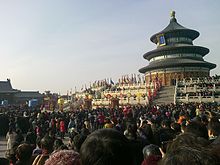Shangdi
Shangdi (Chinese: 上帝; pinyin: Shàngdì; Wade–Giles: Shang Ti), also written simply, "Emperor" (Chinese: 帝; pinyin: Dì), is a Chinese word for god.[1]

Although the name has shang in it, it is a different word in Chinese from Shang dynasty and has a different tone.
In Chinese religion Tian is usually used to refer to God. But "Shangdi" is used by some groups,[2] including some Confucian philosophers,[3] and Protestant Christianity.[4]
Etymology
"Shang Di" is the pinyin romanization of two Chinese characters. The first – 上, Shàng – means "highest" and "first"; the second – 帝, Dì – refers to the High God of Shang, thus means "deity" (manifested god), .[2] Thus, the name Shangdi should be translated as "Highest Deity", but also has the implied meaning of "Primordial Deity" or "First Deity" in Classical Chinese. In the ancient books the shangdi is described with humanlike traits. He is also associated with the North Star.[5]

